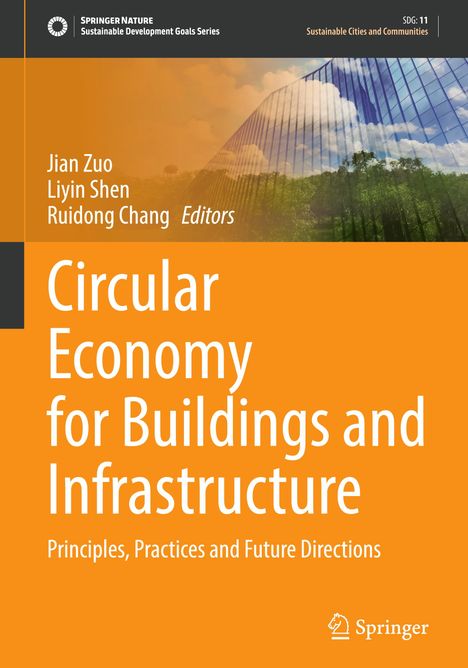Circular Economy for Buildings and Infrastructure, Gebunden
Circular Economy for Buildings and Infrastructure
Buch
- Principles, Practices and Future Directions
lieferbar innerhalb 2-3 Wochen
(soweit verfügbar beim Lieferanten)
(soweit verfügbar beim Lieferanten)
Aktueller Preis: EUR 186,19
- Herausgeber:
- Jian Zuo, Ruidong Chang, Liyin Shen
- Verlag:
- Springer International Publishing, 05/2024
- Einband:
- Gebunden, HC runder Rücken kaschiert
- Sprache:
- Englisch
- ISBN-13:
- 9783031562402
- Artikelnummer:
- 11857438
- Umfang:
- 360 Seiten
- Nummer der Auflage:
- 2024
- Ausgabe:
- 2024
- Gewicht:
- 955 g
- Maße:
- 260 x 183 mm
- Stärke:
- 24 mm
- Erscheinungstermin:
- 4.5.2024
- Hinweis
-
Achtung: Artikel ist nicht in deutscher Sprache!
Klappentext
This edited volume covers theoretical and practical aspects of circular economy in building development, offering chapters dealing with topics such as material design, affordability of housing development, waste management and recycling, smart metering, and more. A particular focus is placed on various stakeholders points of view. The book's chapters are co-developed and contributed by multidisciplinary teams including both academics and industry practitioners. The case study-oriented approach taken here helps to facilitate the reader's understanding of how building sustainability can be achieved in the context of circular economy.The building industry has significant environmental, social and economic impacts. As one of the biggest energy consumers and carbon emitters, building sustainability has attracted wide attention globally. Building projects and their associated activities consume a large amount of energy, natural resources and water while producing a large proportion of wastes throughout their lifecycles. The traditional linear approach of make, use and dispose has been heavily criticized, whilst the circular approach has gained momentum. Indeed, circular economy has emerged as one of key principles to manage sustainability related issues by means of focusing on the circularity of resources as well as the cost implications.

Circular Economy for Buildings and Infrastructure
Aktueller Preis: EUR 186,19

